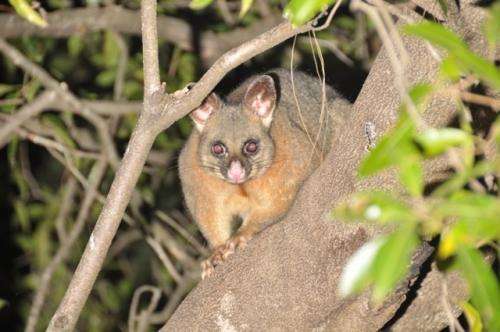June 17, 2015 report
Possums in Tasmania growing bolder as devils decline

(Phys.org)—A team of researchers from several universities in Australia has found that brushtail possums have begun altering their foraging habits in light of the decline of Tasmanian devils in Tasmania and other nearby islands. In their paper published in Proceedings of the Royal Society B, the team describes field studies they conducted on the islands, what they learned and why they believe an ecosystem change is coming.
Tasmanian devils are small scary-looking marsupial animals that live off of animals that they capture and kill—they are native to Tasmania and a few surrounding islands, but over the past decade their numbers have dwindled dramatically as they have been decimated by devil facial tumor disease—a contagious type of cancer. One of their prey is the brushtail possum, an arboreal animal that eats mostly eucalyptus leaves—though they do venture to the ground as often as possible to eat nuts and berries. In this new effort, the researchers wondered if the lifestyle of the possums had changed now that one of their main predators was rarely seen. To find out, they ventured to Tasmania and another island (Maria) in the vicinity that had been devil-free for thousands of years.
The team set up feeders on the ground in both locales stocked with raisins, a food they know the possums like. Some of the feeders were placed close to trees, others farther away, and some of the feeders had rocks mixed in with the raisins, or openings that required a head to be inserted, preventing a possum from seeing if a predator was nearby while it munched.
As expected, the researchers found that the possums had grown bolder—in places that had seen the sharpest declines, the possums were the most bold, behaving in some instances, in much the same way as possums on devil-free Maria island, wandering around on the ground as they pleased. What was surprising was how quickly the possums had adapted to the nearly sudden absence of the devils.
The researchers suggest their findings offer information that might prove useful in other areas, where it is not possible to study a declining apex predator in isolation, such as Yellowstone National Park in the U.S., where park managers have been experimenting with reintroducing wolves. They also note that increased foraging by possums is likely to cause an as yet unknown impact on the local ecosystem.
More information: Relaxation of risk-sensitive behaviour of prey following disease-induced decline of an apex predator, the Tasmanian devil, Proceedings of the Royal Society B, DOI: 10.1098/rspb.2015.0124
Abstract
Apex predators structure ecosystems through lethal and non-lethal interactions with prey, and their global decline is causing loss of ecological function. Behavioural changes of prey are some of the most rapid responses to predator decline and may act as an early indicator of cascading effects. The Tasmanian devil (Sarcophilus harrisii), an apex predator, is undergoing progressive and extensive population decline, of more than 90% in long-diseased areas, caused by a novel disease. Time since local disease outbreak correlates with devil population declines and thus predation risk. We used hair traps and giving-up densities (GUDs) in food patches to test whether a major prey species of devils, the arboreal common brushtail possum (Trichosurus vulpecula), is responsive to the changing risk of predation when they forage on the ground. Possums spend more time on the ground, discover food patches faster and forage more to a lower GUD with increasing years since disease outbreak and greater devil population decline. Loss of top–down effects of devils with respect to predation risk was evident at 90% devil population decline, with possum behaviour indistinguishable from a devil-free island. Alternative predators may help to maintain risk-sensitive anti-predator behaviours in possums while devil populations remain low.
Journal information: Proceedings of the Royal Society B
© 2015 Phys.org




















